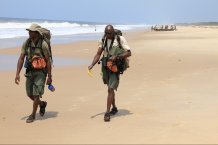
A WCS marine research team. Credit: Tim Collins, WCS
Congo creates first Marine Protected Areas
The Republic of the Congo has created its first ever Marine Protected Areas (MPAs), supported by a research team including the University of Exeter and the Wildlife Conservation Society.
The three new MPAs will protect more than 4,000 square km (1,500 square miles) off the West African coast – covering 12% of Congo’s Exclusive Economic Zone.
The area includes globally important nesting grounds for leatherback turtles, and critical migrating and breeding habitats for marine mammals including Atlantic humpback whales.
The new MPAs are home to more than 40 species of sharks and rays, including the world’s largest fish, the open ocean whale shark.
Rosalie Matondo, Congo's Minister of Forest Economy, said the creation of the MPAs was the "culmination of a long process" which began years ago with the Wildlife Conservation Society (WCS) helping to identify suitable sites for protection.
She added: "I would like to thank our partners who never cease to deploy their efforts for the conservation of biodiversity in Congo, notably WCS, for their multiform support to this conservation action."
The MPA creation is part of a national Marine Spatial Plan approved in 2019, with support from WCS, the University of Exeter and local NGO Renatura, under the landmark "Congo Marine" Initiative.
The plan identified 11 possible MPAs in Congo’s Exclusive Economic Zone, with the first three now formally announced.
The three MPAs are: a marine extension to Conkouati-Douli National Park along the border with Gabon, Loango MPA and Mvassa MPA.
Exeter's contribution included working with small-scale fishers to find out when and where they fish, and ensure they were represented in the decision-making process.
"We started working in Congo in 2013, and helped with the launch of Congo Marine in 2016," said Dr Kristian Metcalfe, of the Centre for Ecology and Conservation at Exeter's Penryn Campus in Cornwall.
"Since then, we have worked with a wide range of partners and stakeholders on consultations, building local research capacity and analysing data on Congo's marine biodiversity and habitats.
"Creating an effective MPA network isn't a quick process, so we're delighted to see Congo's first three MPAs announced after years of hard work by a wide range of people and organisations.
"This isn't the end of our work – we now need to monitor these MPAs, to measure their effectiveness and ensure they improve Congo's marine environment."
In 2016, WCS socio-economic surveys showed that 49% of small-scale fishers had suffered loss or damage due to illegal industrial fishing vessels.
"Fishermen are sometimes afraid to go fishing at sea because they fear encountering large boats, especially at night," said Martin Safou, a coastal village chief in Bondi, during a community consultation.
Illegal, Unreported, and Unregulated Fishing (IUU) is a threat to the exceptional biodiversity of Congolese waters, but also to the livelihood of thousands of small-scale fishers who actively participated in the creation of the MPAs.
The creation of the MPAs, which provide for community fishing zones, is intended to be an effective tool against illegal and unregulated fishing.
Richard Malonga, WCS Country Director in Congo, said: "It is a pleasure to note that the support that the WCS Congo programme brings to the government is capitalised through this series of creations of MPAs and the extension of the Conkouati National Park on its marine part.
"Today the Republic of Congo has optimised its participation in international efforts to conserve the marine environment."
Congo is the latest West African country to create MPAs, following in the footsteps of Gabon and Ivory Coast.
Exeter's work in the Republic of the Congo was supported by the UK government's Darwin Initiative and the Waterloo Foundation.
Date: 2 September 2022
